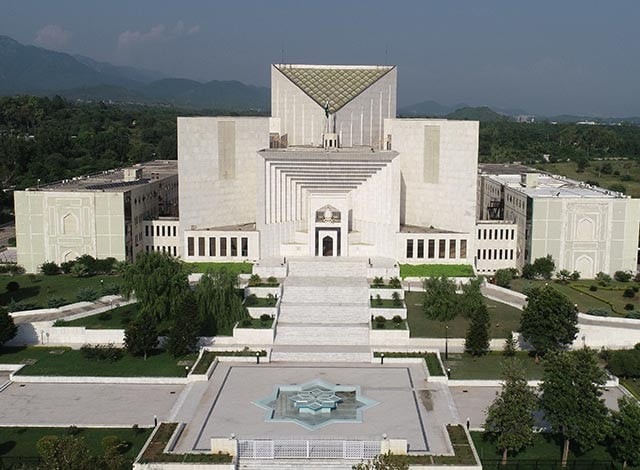Constitutional bench defers military trial appeals
Committee refers matter to JCP

The Constitutional Bench of the Supreme Court has expressed its inability to hear the intra-court appeals (ICAs) against the top court's ruling in a case pertaining to the trial of civilians in military courts, and decided to approach the Judicial Commission of Pakistan (JCP) on that matter.
The matter came up in a meeting of the three-member committee of the Constitutional Bench. The meeting was chaired by Justice Aminuddin Khan and attended by Justice Jamal Khan Mandokhail, Justice Muhammad Ali Mazhar, besides the registrar.
According to a press release issued by the Supreme Court, the committee decided that Justice Ayesh Malik could not sit on the Constitutional Bench for the hearing of the ICAs, since she was part of the five-member bench that had ruled against the military trial of civilians.
On October 23, last year, the bench led by Justice Ijazul Ahsan and comprised justices Munib Akhtar, Yayha Afridi, Sayyed Mazahar Ali Akbar Naqvi, and Ayesha Malik, with a majority of 4-1, struck down the section of the Pakistan Army Act, which allowed the court martial of civilians.
The only dissent came from Justice Yahya Afridi, who is now the Chief Justice of Pakistan. Though, Chief Justice Afridi had agreed that the civilians could not be tried in the military courts for the events of May 9, 2023, but disagreed with the majority on striking down the relevant section of the Army Act.
The majority judgements were authored by Justice Akhtar and Justice Malik. Later, in July 2024, Attorney General for Pakistan (AGP) informed the Supreme Court that the appeals against the apex court judgment had been filed as per the advice of the Law Division.
A seven-member bench, led by Justice Aminuddin Khan and including Justice Mandokhail, Justice Mazhar, Justice Hasan Azhar Rizvi, Justice Shahid Waheed, Justice Irfan Saadat Khan, and Justice Shahid Bilal Hassan heard those appeals.
According to the press release, the matter regarding hearing of the ICAs on the trial of civilians by military courts was taken up by the committee in its meeting on November 13. It noted that Justice Malik was part of the bench that decided the case, against which the ICAs were pending.
"The Committee noted that Mrs Justice Ayesha A Malik, being a member of the earlier Bench, whose judgment is under challenge, cannot serve on the Constitutional Bench for these appeals," the press release stated.
"Since the original ICAs were heard by a seven-member Bench, the Committee resolved to approach the Judicial Commission of Pakistan for the Constitutional Bench to ensure the matter is heard promptly," it added.
"The Registrar was tasked to prepare draft rules regulating the practice and procedures of the Constitutional Bench in consultation with Hon'ble Justice Muhammad Ali Mazhar, with the final draft to be reviewed by the Committee for approval."
According to the press release, the committee also deliberated on other critical matters aimed at improving the efficiency and transparency of the case management, particularly for the Constitutional Bench.
To expedite the disposal of the pending appeals, the committee directed the office for categorisation and compilation of the cases within one week, and fixation of five chamber appeals daily for hearing before each member of the committee.
To address the increasing workload, the committee recommended the requisition of a civil judge to provide judicial assistance. In line with steps to improve case identification and tracking, the committee approved the use of a distinctive green stamp marked "Constitutional Bench" for all relevant case files.
"This change will also be reflected in the Court's IT-based Case Flow System through integrated colour-coded tagging. Order sheets for Constitutional matters were standardised to include the headings 'In the Supreme Court of Pakistan,' 'Constitutional Bench', and the specific jurisdiction type, whether original, appellate, or advisory."
The press release further stated that in order to ensure procedural clarity, all cases under the Article 191A would include titles explicitly designating them as belonging to the Constitutional Bench of the Supreme Court of Pakistan.
"Furthermore, it was decided that parties filing such cases must prepare and submit at least seven paper books. Applications for early hearings will be placed before the Committee until the procedural rules for urgent cases are finalised, ensuring prioritised attention to pressing matters," it added.
The committee reiterated that the Supreme Court exclusively held the authority to transfer cases and such matters would continue to be heard by regular benches. "Only cases under Article 199 that involve significant constitutional questions or substantial issues of law will be referred to the Constitutional Bench."
In a significant step to enhance operational efficiency, the Committee resolved to establish a dedicated branch to handle Constitutional matters under Article 191A. Additionally, cases already transferred to the Constitutional Bench would be scheduled in accordance with the approved roster.
Meanwhile, the seven-member Constitutional Bench heard various cases on Wednesday. During the hearings, the judges observed that other forums for applications for judicial reforms were also available. They also said some place the judiciary at 120th number and some at 150th but nobody knew from where these numbers came.



















COMMENTS
Comments are moderated and generally will be posted if they are on-topic and not abusive.
For more information, please see our Comments FAQ